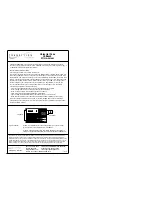
Lake Shore Model 234/234D User’s Manual
Installation
2-3
2.3.2 CONNECTING LEADS TO THE SENSOR
Excessive heat flow through connecting leads to any temperature sensor
may differ the temperature between the active sensing element and the
sample to which the sensor mounts. This reflects as a real temperature
offset between what is measured and the true sample temperature.
Eliminate such temperature errors with proper selection and installation of
connecting leads.
To minimize heat flow through the leads, select leads of small diameter and
low thermal conductivity. Phosphor-bronze or Manganin wire is commonly
used in sizes 32 or 36 AWG. These wires have a fairly low thermal
conductivity, yet electrical resistance is not large enough to create
measurement problems.
Thermally anchor lead wires at several temperatures between room
temperature and cryogenic temperatures to guarantee no heat conduction
through the leads to the sensor.
2.3.3
Four-Lead Measurements
Measure all sensors, including both two-lead and four-lead devices, in a
four-lead configuration to eliminate the effects of lead resistance. The exact
point at which the connecting leads solder to the two-lead sensor normally
results in a negligible temperature uncertainty.
Always use the four-lead measurement configuration with Series CGR
Carbon-Glass and Series GR Germanium Resistance Temperature Sensors
attached to the Model 234.
Figure 2-1. Typical Model 234 to Sensor Connections
Summary of Contents for 234
Page 24: ...Lake Shore Model 234 234D User s Manual 3 4 Operation This Page Intentionally Left Blank ...
Page 36: ...Lake Shore Model 234 234D User s Manual 5 4 Service Figure 5 3 Model 234 PCB Details ...
Page 44: ...Lake Shore Model 234 234D User s Manual 5 12 Service This Page Intentionally Left Blank ...
Page 49: ......
















































